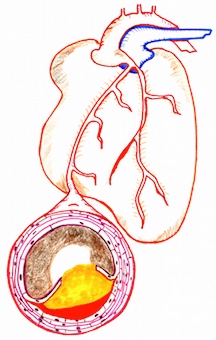
Cardiovascular Health
Hello Everyone,
I had gone to a cardiovascular seminar two
weekends ago and I wanted to share with you
what was talked about.
Some of the following interesting facts from the
latest research:
Cholesterol is made by the liver in response to
stress loads. The greater your stress the higher
your cholesterol levels. Cholesterol is turned into
hormones and we need the hormones to keep up
with the stress. Think of your adrenal glands
responding to stress. We do live in a very fast paced
urban environment with lots of things going on.
Since the liver makes cholesterol based on stress
levels, dietary fat intake does not correlate with
cholesterol increase. So after learning this I managed
to find a German Beer Hall in the middle of Las Vegas. 
I can tell you I did not lose any weight on this trip.
So how do these cultures, including our own, stay alive
with all the acid forming foods and beer?
All of the dinner menus at the restaurant had alkaline
vegetables. They were cabbage, red cabbage, a salad,
or potatoes. And that is the science in the middle of
this restaurant. Alkaline vegetables high in antioxidants
balancing out the acids of the meat and alcohol.
The antioxidants are available to the liver to make stable
healthy cholesterol, by stable I mean the cholesterol fat
did not go rancid. Think rancid butter, your artery cells
do not like it either.
The arteries take in cholesterol as a food source. They
work very hard and this is a good lunch as far as they are
concerned. Is the cholesterol they are taking in as a food
source safe? Is my science adventure at the Beer Hall going
to cause havoc on my arteries cells, or is the cholesterol stable?
We are not talking about how my pants shrunk and my wife
enjoyed poking me in the belly.
And that goes back to the latest research. We can measure very
precisely inflammation in the arteries from oxidized cholesterol
or other dietary deficiencies that would cause damage.
We can even predict the rate of progression of artery damage
when these tests are abnormal.
What we want to know is am I currently experiencing no artery
damage. If my tests are not that good where is the damage
coming from? Is the damage in the arteries from a lack of
antioxidants, lack of B vitamins, lack of magnesium, or all
three? We can now do all of this with the newer better tests.
Next Saturday I will talk about the three tests that matter
and how they work.
Have a very nice weekend, thanks for reading,
Dr. McGuckin
